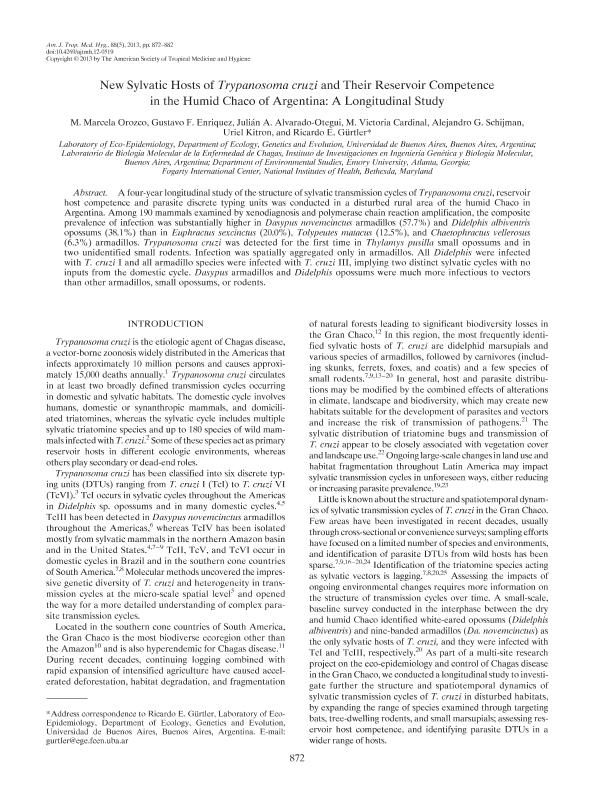Artículo
New sylvatic hosts of Trypanosoma cruzi and reservoir competence in the humid Argentinean Chaco: A longitudinal study
Orozco, Maria Marcela ; Enriquez, Gustavo Fabián
; Enriquez, Gustavo Fabián ; Alvarado Otegui, Julián A.; Cardinal, Marta Victoria
; Alvarado Otegui, Julián A.; Cardinal, Marta Victoria ; Schijman, Alejandro Gabriel
; Schijman, Alejandro Gabriel ; Kitron, Uriel; Gurtler, Ricardo Esteban
; Kitron, Uriel; Gurtler, Ricardo Esteban
 ; Enriquez, Gustavo Fabián
; Enriquez, Gustavo Fabián ; Alvarado Otegui, Julián A.; Cardinal, Marta Victoria
; Alvarado Otegui, Julián A.; Cardinal, Marta Victoria ; Schijman, Alejandro Gabriel
; Schijman, Alejandro Gabriel ; Kitron, Uriel; Gurtler, Ricardo Esteban
; Kitron, Uriel; Gurtler, Ricardo Esteban
Fecha de publicación:
04/2013
Editorial:
American Society of Tropical Medicine and Hygiene
Revista:
American Journal of Tropical Medicine and Hygiene
ISSN:
0002-9637
Idioma:
Inglés
Tipo de recurso:
Artículo publicado
Clasificación temática:
Resumen
A four-year longitudinal study was conducted to investigate the structure of sylvatic transmission cycles of Trypanosoma cruzi, assess reservoir host competence and identify parasite discrete typing units (DTUs) in a disturbed rural area of the humid Argentinean Chaco. Among 190 mammals examined by xenodiagnosis and polymerase chain reaction amplification, the composite prevalence of infection was substantially higher in Dasypus novemcinctus armadillos (57.7%) and Didelphis albiventris opossums (38.1%) than in Euphractus sexcinctus (20.0%), Tolypeutes matacus (12.5%) and Chaetophractus vellerosus (6.3%) armadillos. T. cruzi was detected for the first time in Thylamys pusilla opossums and in two unidentified small rodents. Infection was spatially aggregated only in armadillos. All Didelphis were infected with T. cruzi I and all armadillo species with T. cruzi III, implying two distinct sylvatic cycles with no inputs from the domestic cycle. Dasypus armadillos and Didelphis opossums were much more infectious to vectors than other armadillos, opossums or rodents.
Archivos asociados
Licencia
Identificadores
Colecciones
Articulos(IEGEBA)
Articulos de INSTITUTO DE ECOLOGIA, GENETICA Y EVOLUCION DE BS. AS
Articulos de INSTITUTO DE ECOLOGIA, GENETICA Y EVOLUCION DE BS. AS
Articulos(INGEBI)
Articulos de INST.DE INVEST.EN ING.GENETICA Y BIOL.MOLECULAR "DR. HECTOR N TORRES"
Articulos de INST.DE INVEST.EN ING.GENETICA Y BIOL.MOLECULAR "DR. HECTOR N TORRES"
Citación
Orozco, Maria Marcela; Enriquez, Gustavo Fabián; Alvarado Otegui, Julián A.; Cardinal, Marta Victoria; Schijman, Alejandro Gabriel; et al.; New sylvatic hosts of Trypanosoma cruzi and reservoir competence in the humid Argentinean Chaco: A longitudinal study; American Society of Tropical Medicine and Hygiene; American Journal of Tropical Medicine and Hygiene; 88; 5; 4-2013; 872-882
Compartir
Altmétricas



